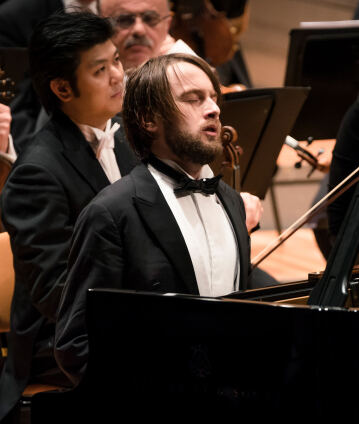Andris Nelsons y Daniil Trifonov

El Concierto para piano de Aleksandr Skriabin es una obra sorprendentemente poco interpretada. En este programa puede descubrir esta obra por usted mismo: sus sueños y pasiones, su riqueza inagotable de gradaciones emocionales. El solista es Daniil Trifonov, «quizás el pianista más apasionante que ha surgido internacionalmente en los últimos treinta años» (The Guardian). Andris Nelsons dirige además la Sinfonía núm. 11 de Shostakóvich, que impresiona con la fuerza visual de una partitura cinematográfica.
“His playing is a perfect example of the unique, indescribable charm of the Slavs, who are the best pianists in the world.” These lines – written in 1897 – were not meant for Daniil Trifonov, the Artist in Residence for the 2018/19 season, but Alexander Scriabin. Although a temporary injury to his right hand in 1891 nearly put an end to his pianistic career, Scriabin, who was born in 1872, first made a name for himself as a piano virtuoso after completing his studies at the conservatory in his native city of Moscow. As an eccentric par excellence and a clever marketing strategist, he consistently limited himself to interpretations of his own works when he performed.
Scriabin’s only piano concerto, which had its premiere in 1897, follows the traditional three-movement form, and the shimmering chromaticism of the score is firmly anchored in the extended tonality of the late 19th century. Nevertheless, with this work the composer also en passant, as it were, bridged a gap between two far more prominent colleagues: seemingly improvised, elegant arabesques in the solo instrument recall the music of Frédéric Chopin, while the subtle dialogues between the piano and the orchestra woodwinds are obviously echoed in Sergei Rachmaninov’s concertos. Rachmaninov’s pianistic shows of strength are for the most part alien to Scriabin, however. Despite considerable demands on the pianist’s technical skills, the solo instrument never descends into superficial virtuosity. When – as in the graceful second theme of the first movement, for example – it monopolizes the proceedings for a moment, it is with almost disarmingly straightforward octaves in both hands. The second movement consists of richly figured variations on a characteristic theme, until pianistic arabesques finally become part of the theme in the finale of the concerto; its development is characterized by a carefully calculated increase and decrease in musical intensity.
This rarely played work is interpreted by pianist Daniil Trifonov, who was born in 1991 and is not only approximately the same age as Scriabin was when he composed his piano concerto but is also considered one of the best pianists in the world today. The second half of the concert, conducted by Andris Nelsons, features Dmitri Shostakovich’s Eleventh Symphony, which reflects on the historical events during the Russian Revolution of 1905.
© 2019 Berlin Phil Media GmbH
Entrevistas del concierto
Artistas
Nuestras recomendaciones
- Kirill Petrenko y Daniil Trifonov
- Concierto de Nochevieja de 2024 con Kirill Petrenko y Daniil Trifonov
- Concierto de Nochevieja de 2016 con Sir Simon Rattle y Daniil Trifonov
- Concierto con Kirill Petrenko y Daniil Trifonov
- Mariss Jansons y Daniil Trifonov con el Concierto para piano de Schumann
- Recital pianístico con Daniil Trifonov